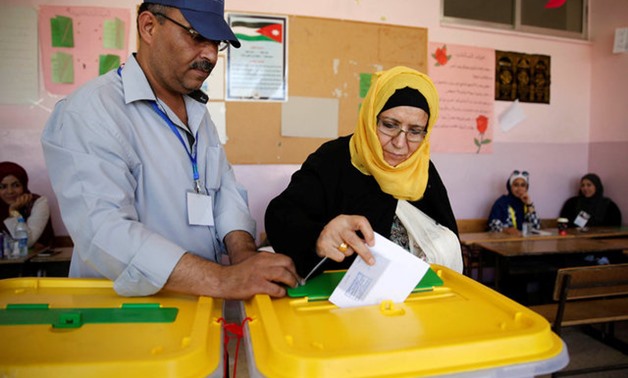
A Jordanian woman casts her ballot at a polling station for local and municipal elections in Amman, Jordan, August 15, 2017. REUTERS/Muhammad Hamed
CAIRO – 15 August 2017: Jordanian Islamists take part in the municipal councils’ elections after ten years of boycott in protest against “voting irregularities” in the elections held in 2007.
The Islamic Action Front, the political arm of the Muslim Brotherhood in Jordan and the most influential political opposition group in the country, announced taking part in the local elections and the nomination of 60 Islamist candidates.
With the ballot stations expected to receive up to 4.1 million voters on Tuesday, 20,000 policemen are securing them, according to France 24.
According to the Jordanian Election Commission, 6,622 candidates are competing for 2,109 seats in the municipal councils and 380 seats in the governorates’ councils.
Muslim Brotherhood boycott since 2007
The Islamic Action Front withdrew from the local elections in 2007. The Brotherhood announced that because of violence and accusations of irregularities, its participation would lend legitimacy to the government’s efforts to weaken it.
“The level of corruption we witnessed made it impossible for us to continue with this election,” said Zaki Bani Rsheid, the group’s secretary general, to the New York Times on August 1, 2007. Rsheid said that although the group had withdrawn, it was not boycotting the political process altogether, the New York Times added.
“It’s our first participation in the local elections since we withdrew from the 2007 elections,” Sheikh Murad al-Adaila, Brotherhood High Elections Committee of the Islamic Action Front Party told France 24.
Al-Adaila added that the Brotherhood had boycotted the elections since 2001.
“Our candidates reach 48 in the decentralized councils, 12 candidates compete for Amman’s secretary general and 3 candidates are competing for chairmanship of major cities’ councils,” Al-Adaila added.
In September 2016, Islamists took part in the parliamentary elections and won 15 seats out of 130 via the National Reform Coalition, while the Islamic Action Front boycotted the elections in 2012 and 2013 in protest against the one-vote electoral system.

Comments
Leave a Comment